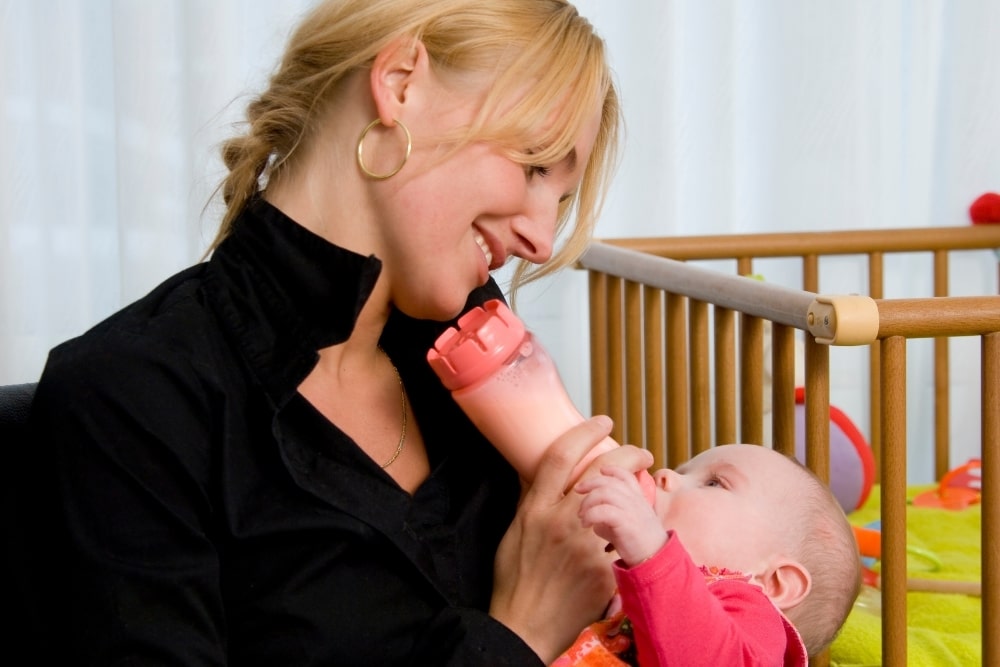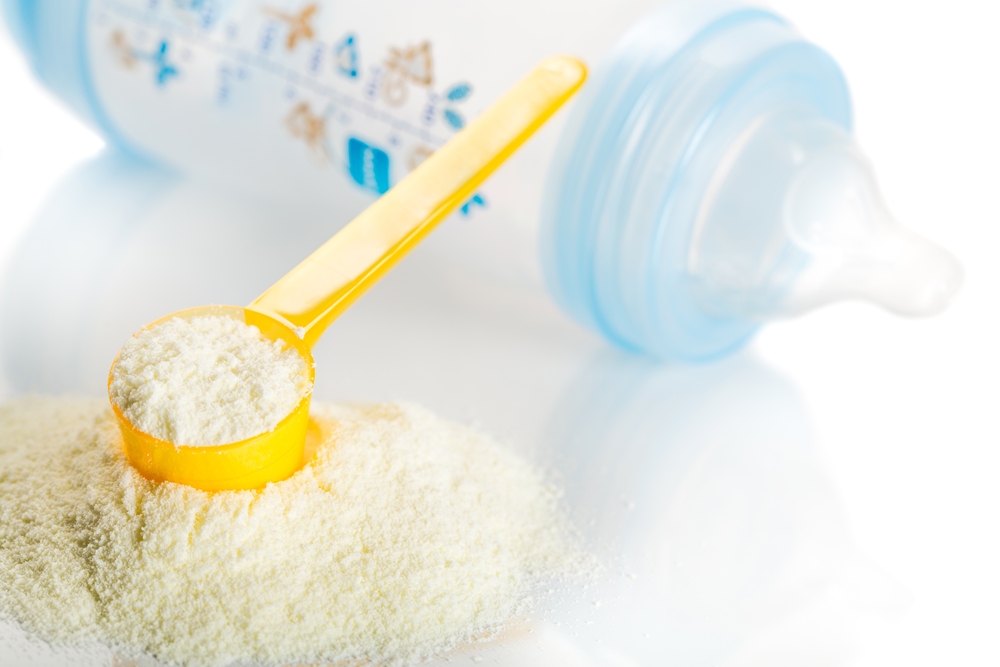There are many parenting decisions expectant parents feel they need to make before their new baby arrives. Crib or co-sleep? Stroller or baby carrier? Sleep training or rock to sleep? Breastfeed or bottle-feed?
The best thing about parenting is that there is not just one way to do it and it is up to parents to choose the best parenting path for their baby.
When you think about it, it may feel like you need to make a lot of concrete decisions when it comes to parenting but you really don’t. You can change your mind if you want to, try lots of different parenting styles and just figure out what works best as you go along.
So, you might think you have to choose between the stroller or the baby carrier but you can use them both if that is what you want to do. The same goes for nursing and bottle feeding, it doesn’t have to be one or the other.
Combination feeding is more common than you may think and lots of parents choose to nurse their baby as well as giving them bottles of formula too.
Many expectant moms worry about combining breastfeeding and bottle feeding, they are often particularly concerned about giving formula at night and breastfeeding during the day.
In this article, we will discuss what combination feeding is, why some parents choose to combi feed and we will answer common questions about giving a breastfed baby formula at night.
What Is Combination Feeding?
Combination feeding – sometimes referred to as mixed feeding, combined feeding, combi feeding, or partial breastfeeding – is when a breastfed baby is also given bottles of formula or expressed breastmilk.
To put it simply, combination feeding is when a nursing baby is also sometimes fed milk from a bottle.
View in gallery
Some parents may decide they want to combi feed before their baby has even been born but certain circumstances may cause a previously exclusively nursing mom to also feed her baby from a bottle.
Why Do Some Moms Combination Feed Their Baby?
There are many reasons why parents may decide to use formula and breastfeed.
Difficulty breastfeeding
Breastfeeding may be natural but it is not always easy, many new moms find nursing difficult in the early days. Some nursing moms decide to combination feed because breastfeeding is causing issues like cracked or bleeding nipples.
Any nursing mom will tell you that the newborn days are exhausting and sometimes moms decide to introduce bottles so someone else can feed the baby and they can rest.
Returning to work
Combination feeding is common in nursing mothers who have returned to work while their baby is still breastfeeding.
Not all moms want to wean their baby from the breast before they return to work and if their baby still needs milk during the day then they will need to be bottle feed while mom is away.
Sharing the feeds
Some moms don’t want the sole responsibility of being the only person in the whole world who is able to feed the baby. Breastfeeding and bottle-feeding allow other members of the family to feed the baby.
If a baby will also drink milk from a bottle it allows mom to have a break from nursing and to leave the baby with a sitter or family member without worrying about rushing home before the next feeding time.
View in gallery
Is It Okay To Give A Breastfed Baby Formula At Night?
Whilst combination feeding is the feeding path many parents decide to take, not all nursing moms know if they can give their breastfed baby formula at night and continue to breastfeed during the day.
The answer to this question will vary from mom to mom and baby to baby. In a perfect and totally unrealistic world, nursing moms would not give their babies a bottle at all.
We don’t live in a perfect world though, breastfeeding can be really challenging and even if it was always easy, the reasons stated above show that combination feeding can be really beneficial for parents.
As long as it is done carefully and with your baby’s personal situation and needs in mind, it is okay to give a breastfeeding baby formula at night and nurse them during the day.
When To Introduce Formula At Night To A Breastfed Baby?
There is not a perfect age to start giving your nursing baby bottles of formula during the night. Experts advise waiting until your baby is around 4-6 weeks old and there are a few reasons they say this.
Firstly, if you introduce bottles too soon it may make establishing breastfeeding difficult. Some babies may prefer drinking from the bottle to drinking from the breast and this may lead to them refusing the breast early on in your breastfeeding journey.
If you wait for breastfeeding to be established your baby should have less trouble switching between the breast and bottle.
If you wait 4-6 weeks before introducing a bottle, your baby should have developed a good breastfeeding technique and be less likely to have developed a preference for the bottle.
View in gallery
Introducing formula can pose a risk to your milk supply as breastfeeding works on a supply and demand basis. If your baby is drinking formula regularly, your body is not being provided with the signals it needs to make more milk.
This won’t be problematic if you plan on sticking to a strict boob/bottle feeding schedule.
But if you think you might want to start nursing more regularly again, it may take you a while to build your supply back up to meet the needs of your baby (assuming you haven’t been finding slithers of time to pump breastmilk alongside formula feeding and nursing, that is).
Mixing bottle feeding with breastfeeding too soon can cause nipple confusion in your baby. Nipple confusion is when your baby struggles to easily transition between feeding from the breast and feeding from a plastic bottle nipple.
Nipple confusion can lead to a baby not knowing how to correctly latch on at the start of breastfeeding and can also cause babies to refuse the breast or the bottle as they can’t easily remember how to best get the milk from each source.
Babies need to master different sucking and latching techniques for breastfeeding and bottle feeding.
Introducing Formula To A Breastfed Baby At Night – Tips & Advice
If you want to breastfeed during the day and use formula at night, a little bit of planning needs to be done in advance to help you and your baby successfully manage this change in your feeding routine.
We have put together some tips to help you introduce formula at night to your breastfed baby.
Learn how to make up formula in advance
You don’t want to be preparing a bottle of formula for the first time when you are half asleep and zombified at 3 am. Read the preparation guidelines, have all your bottles sterilized ready, and maybe do a test run on the day first.
View in gallery
Take it slow
Don’t expect to go from five breastfeeding sessions a night to just giving two bottles of formula between sunset and sunrise. It will take time to fully transition to only feeding formula during the night.
Remember, nursing is so much more than feeding and it may take time for your baby to get used to not having regular comfort from breastfeeding throughout the night.
Have someone else feed the baby
Nursing babies are more likely to accept a bottle of formula from someone else than from their mom. Babies can smell your breastmilk and will instinctively start rooting for your breast when they wake hungry in the night.
If your baby isn’t used to bottle feeding yet they may become frustrated and upset when you refuse to nurse them and offer a bottle of formula instead. Dad, for example, will not smell like breastmilk and your baby does not associate their father with breastfeeding.
This disconnect from nursing may make your baby more accepting of a bottle of formula, they know there is no breastmilk available from Dad so will drink from the bottle instead to satisfy their middle of the night hunger.
If you can be in a different room from your baby when they are getting used to drinking formula this can help to make the transition even easier as they won’t be able to smell you.
Work out how much formula milk to feed your baby
If you are supplementing your breastfed baby with a formula for medical reasons, such as weight gain issues, your doctor should have provided you with specific feeding guidelines to follow.
View in gallery
If you are choosing to give formula at night for personal reasons then you need to follow the guidelines on the formula milk packaging to make sure you give your baby the correct amount of ounces for their age.
Don’t expect your baby to drink a whole bottle the first time, it may take a while for them to reach that point.
It is also important to remember that formula is more difficult for babies to digest when compared to breastmilk and this may influence how often they wake to feed during the night and how much they are comfortable drinking at each feed.
Gradually swap breastfeeds for formula at night
Start with switching one breastfeed a night for a formula feed and gradually build up to exclusively formula feeding at night.
Your baby is going to need to get used to consuming something different from breastmilk and you will need to give their digestive system the time it needs to adjust.
By switching slowly from nursing at night to bottle feeding you will be able to easily ease off the formula again if you notice any negative effects the formula milk may be having on your baby’s health.
Also, making the switch from breast to bottle at night gradually will give your body time to adjust and regulate your milk supply.
If you try to go cold turkey from breastfeeding at night straight away there is a risk of you getting blocked milk ducts, painfully engorged breasts, or mastitis. Just swap the feeds slowly and your milk supply will be able to adjust more comfortably.
[amalinkspro type=”showcase” asin=”B077M4Q27K” apilink=”https://www.amazon.com/dp/B077M4Q27K?tag=mominformedcom-20&linkCode=osi&th=1&psc=1″ new-window=”true” addtocart=”false” nofollow=”true” sc-id=”5″ img-sizes=”500:500″ imgs=”https://m.media-amazon.com/images/I/51YMBibndKL._SL500_.jpg” link-imgs=”false” btn-color=”#ff9900″ btn-text=”Check Price” alignment=”aligncenter” hide-prime=”0″ hide-image=”0″ hide-price=”1″ hide-button=”0″ width=”400″]Enfamil NeuroPro Baby Formula, Brain and Immune Support with DHA, Iron and Prebiotics, Infant formula Inspired by Breast Milk, Non-GMO[/amalinkspro]
The Final Thought
Is it okay to give a baby formula at night and breastfeed during the day? Yes, you can nurse in the daytime and give bottles of formula at night and there are many reasons why moms choose to feed this way.
To successfully combination feed you need to wait until your baby is 4-6 weeks old and you have established breastfeeding and built up a good milk supply.
Always speak to your doctor or a lactation consultant if you want expert guidance on how to best give formula at night and breastfeed during the day.




![15 Formulas Closest To Breastmilk in [year]](https://cdn.mominformed.com/wp-content/uploads/2021/08/baby-drinking-milk-bottle-feed-150x150.jpg)

